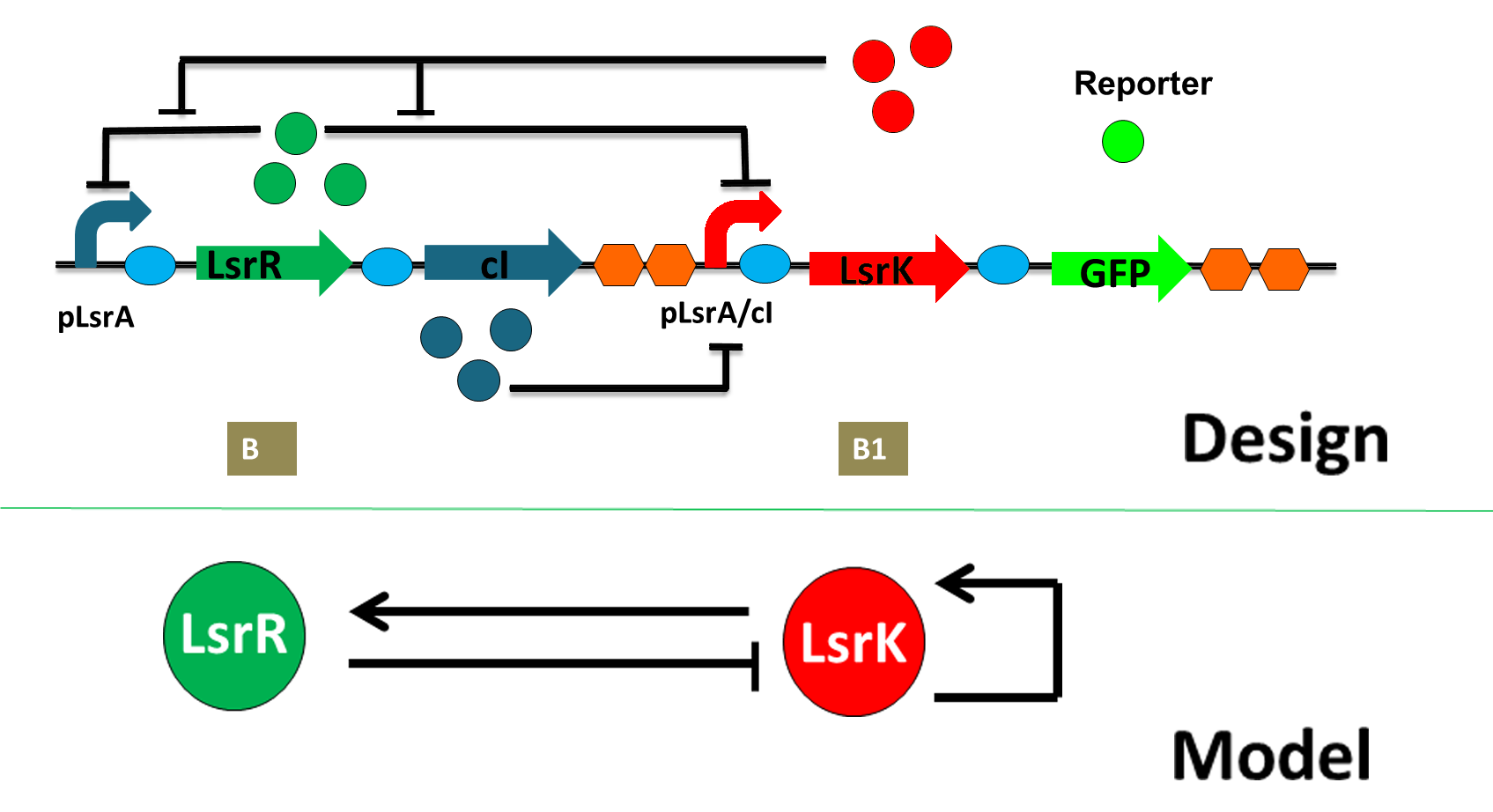|
|
| Line 155: |
Line 155: |
| | <div id="content1"> | | <div id="content1"> |
| | <div class="wide" id="wide1"> | | <div class="wide" id="wide1"> |
| - | <img src="https://static.igem.org/mediawiki/2011/4/4c/Oscillator4.png" width="80%" height="280" style="margin-left:5%"/> | + | <img src="/wiki/images/c/cd/Oscillator5.png" width="80%" height="280" style="margin-left:5%"/> |
| | <p> | | <p> |
| | This is our gene circuit designed to equip our E.coli with the ability to change color with time.</br> | | This is our gene circuit designed to equip our E.coli with the ability to change color with time.</br> |
| | The key players are LsrR and LsrK. The alternation of their expression results in the oscillating concentration of the reporter—GFP, and thus yield the periodically changing color. </br> | | The key players are LsrR and LsrK. The alternation of their expression results in the oscillating concentration of the reporter—GFP, and thus yield the periodically changing color. </br> |
| | Theoretically, at the very beginning, LsrR is expressed and inhibits LsrK. After some time, LsrR inhibits itself and its concentration drops. Therefore LsrK has a chance to express and climbs due to its self-enlarging. However, LsrK induces the re-expression of LsrR at the same time. In this way, their concentrations wave alternatively. C1’s function is to delay the oscillation and stabilize the system.</br> | | Theoretically, at the very beginning, LsrR is expressed and inhibits LsrK. After some time, LsrR inhibits itself and its concentration drops. Therefore LsrK has a chance to express and climbs due to its self-enlarging. However, LsrK induces the re-expression of LsrR at the same time. In this way, their concentrations wave alternatively. C1’s function is to delay the oscillation and stabilize the system.</br> |
| - | In the mathematic modeling section , we make stimulation about the oscillator and consider two possible circumstance.</p>
| + | </p> |
| - | </div>
| + | |
| - | | + | |
| - | <div class="high" id="high1">
| + | |
| - | <div id="left1" >
| + | |
| - | <div class="left" id="l1" style="left:60px;width:400px;height:160px;margin-top:10px;">
| + | |
| - | The system including two protein:</br>
| + | |
| - | Using delay differential equation to describe the system:</br>
| + | |
| - | </div>
| + | |
| - | <div class="left" id="l2">
| + | |
| - | <p style="width:900px;">Where<img src="/wiki/images/e/ec/Image002.png"/>means the volume of<img src="/wiki/images/2/29/Whu-Image004.png" />,<img src="/wiki/images/8/89/Image004.png"/>means the volume of<img src="/wiki/images/3/3c/Image005.png" />,<img src="/wiki/images/3/3e/Image006.png" />means the delay time of the reaction.</p>
| + | |
| - | <p> This is the classic DDE , using the matlab software, we got the solution image ;</p>
| + | |
| - | </div>
| + | |
| - | <div class="left" id="l3">
| + | |
| - | <p style="position:absolute;width:600px;top:-80px;">
| + | |
| - | We mainly consider the system including three protein:
| + | |
| - | We also use ODE to describe the system:</p>
| + | |
| - | </div>
| + | |
| - | <div class="left" id="l4">
| + | |
| - | | + | |
| - | <p style="position:absolute;top:-140px;">where:<img src="/wiki/images/0/06/Image010.png">means the volume of <img src="/wiki/images/7/79/Image011.png"></br>
| + | |
| - | though dimensionless:</p>
| + | |
| - | <p style="position:absolute;top:260px;width:900px;">
| + | |
| - | The balance point of the equation is<img src="https://static.igem.org/mediawiki/2011/9/9e/Image013.png">and <img src="/wiki/images/1/1d/Image014.png"> </p>
| + | |
| - | </div>
| + | |
| - | </div>
| + | |
| - | | + | |
| - | <div id="right1">
| + | |
| - | <div class="right" id="r1" style="height:190px;">
| + | |
| - | <img src="/wiki/images/9/91/Whu-model-two-points.png" height="250" width="380">
| + | |
| - | </div>
| + | |
| - | <div class="right" id="r2">
| + | |
| - | <img src="/wiki/images/8/89/Whum2.png" height="200" width="350" style="position:absolute;top:90px;left:50px;">
| + | |
| - | </div>
| + | |
| - | <div class="right" id="r3">
| + | |
| - | <img src="/wiki/images/8/8e/Whu-m3.png" height="300" width="320" style="position:absolute;top:20px;left:-50px;">
| + | |
| - | </div>
| + | |
| - | <div class="right" id="r4" style="left:60px;">
| + | |
| - | <img src="/wiki/images/e/e9/Whu-m4.png" height="300" width="280" style="position:absolute;top:30px;left:-150px;">
| + | |
| - | </div>
| + | |
| - | </div>
| + | |
| - | | + | |
| - | | + | |
| - | </div>
| + | |
| - | | + | |
| - | | + | |
| - | | + | |
| - | <div class="wide" id="wide2">
| + | |
| - | <p style="position:relative;" >Using the MATLAB software to plot we got the solution image:</p>
| + | |
| - | <img src="/wiki/images/c/cc/Whu-m5.png" height="263" width="600" style="position:relative;left:150px;top:-10px;">
| + | |
| - | </div>
| + | |
| - | | + | |
| - | <div class="high" id="high2" style="height:950px;">
| + | |
| - | <div id="intro">
| + | |
| - | Bifurcation analysis chart:
| + | |
| - | </div>
| + | |
| - | <div id="left2">
| + | |
| - | <div class="leftt" id="l12">
| + | |
| - | | + | |
| - | <p>
| + | |
| - | <img src="/wiki/images/b/b2/Image017.png">is the Hopf bifurcation point, when<img src="/wiki/images/d/d3/Image018.png">,it is able to generate a stable periodic solution.</p>
| + | |
| - | </div>
| + | |
| - | <div class="leftt" id="l22">
| + | |
| - | | + | |
| - | <p>
| + | |
| - | <img src="/wiki/images/9/92/Whu-Image020.png">is the Hopf bifurcation point, when<img src="/wiki/images/a/a6/Whu-Image021.png">,it is able to generate a stable periodic solution.</p>
| + | |
| - | </div>
| + | |
| - | <div class="leftt" id="l32">
| + | |
| - | | + | |
| - | <p>
| + | |
| - | <img src="/wiki/images/8/81/Image023.png">is the Hopf bifurcation point, when<img src="/wiki/images/0/0d/Image024.png">,it is able to generate a stable periodic solution.</p>
| + | |
| - | </div>
| + | |
| - | <div class="leftt" id="l42">
| + | |
| - | | + | |
| - | <p>
| + | |
| - | <img src="/wiki/images/8/8d/Image026.png">is the Hopf bifurcation point, when<img src="/wiki/images/9/94/Image027.png">,it is able to generate a stable periodic solution.</p>
| + | |
| - | </div>
| + | |
| - | </div>
| + | |
| - | | + | |
| - | <div id="right2">
| + | |
| - | <div class="rightt" id="r12">
| + | |
| - | <img src="/wiki/images/8/89/Whu-m6.png" height="220" width="450">
| + | |
| - | </div>
| + | |
| - | <div class="rightt1" id="r22">
| + | |
| - | <img src="/wiki/images/c/c9/Whu-m7.png" height="250" width="580">
| + | |
| - | </div>
| + | |
| - | <div class="rightt1" id="r32">
| + | |
| - | <img src="/wiki/images/0/0f/Whu-m8.png" height="250" width="580">
| + | |
| - | </div>
| + | |
| - | <div class="rightt1" id="r42">
| + | |
| - | <img src="/wiki/images/4/49/P9.png" height="250" width="580">
| + | |
| - | </div>
| + | |
| - | </div>
| + | |
| - | | + | |
| - | </div>
| + | |
| - | | + | |
| - | <div class="wide" id="wide3" >
| + | |
| - | <p>Cycle with the curve of each parameter:</p>
| + | |
| - | <img src="/wiki/images/0/0a/Whu-m10.png" height="350" width="600" style="position:relative;left:100px;"/>
| + | |
| - | | + | |
| - | | + | |
| - | | + | |
| - | | + | |
| - | <div style="position:relative">
| + | |
| - | <p>As the changes of cycle time with the change of the parameters in the image , we can get the conclusion that:</br>
| + | |
| - | 1.<img src="/wiki/images/6/63/Whu-Image029.png"/>have little influence on the range.</br>
| + | |
| - | 2.<img src="/wiki/images/8/82/Image030.png"/>do not have much influence on the cycle time.</br>
| + | |
| - | 3.<img src="/wiki/images/1/11/Image031.png"/>have inversely proportional relationship with the cycle time , it have a huge influence on the cycle time , but little impact on the range (Can be used to adjust the cycle to maintain constant amplitude)</br>
| + | |
| - | 4.When<img src="/wiki/images/9/94/Image032.png"/>,<img src="/wiki/images/2/21/Image033.png"/> have little influence on the range.
| + | |
| - | </br>
| + | |
| - | This conclusion we get before can be used to guide the design of biological systems, in order to achieve the adjustment period, amplitude can adjust the size of some parameters.</p></div>
| + | |
| - | | + | |
| | </div> | | </div> |
| | | | |
| | | | |
| - | <div style="height:100px;"></div>
| |
| | | | |
| | | | |

This is our gene circuit designed to equip our E.coli with the ability to change color with time.
The key players are LsrR and LsrK. The alternation of their expression results in the oscillating concentration of the reporter—GFP, and thus yield the periodically changing color.
Theoretically, at the very beginning, LsrR is expressed and inhibits LsrK. After some time, LsrR inhibits itself and its concentration drops. Therefore LsrK has a chance to express and climbs due to its self-enlarging. However, LsrK induces the re-expression of LsrR at the same time. In this way, their concentrations wave alternatively. C1’s function is to delay the oscillation and stabilize the system.

 "
"





